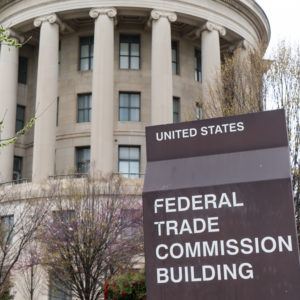Thanks to industry maneuvering, the FTC is a weak agency, without the rulemaking authority of most other agencies, and with constraints on its enforcement authority against corporate wrongdoing.
But there’s another problem at the FTC: It’s far too soft in regulating misleading and deceptive practices by corporations. The agency has taken an especially light approach to enforcement, especially against Silicon Valley titans such as Facebook, Google and Uber.
Here’s one likely reason: Most top FTC officials become lawyers and lobbyists for major technology companies after they leave the agency or bring Silicon Valley conflicts with them when they arrive, a new Public Citizen report found.
The report shows that a jaw-dropping 63 percent of these officials have revolving door conflicts of interest involving work on behalf of the technology sector.
The revolving door problem is bipartisan. Six of the 10 Democratic FTC commissioners who served during the last two decades have corporate revolving door conflicts, as do 10 of the 14 Republican commissioners.
It’s awfully hard for top FTC officials to be tough on worsening tech company wrongdoing if they previously worked for tech companies or are likely to seek employment with tech companies once they leave the agency.
Since 2010, several major technology sector firms have recently been subject to FTC investigations over antitrust, consumer protection and especially data privacy concerns, including Facebook, Google, Ap
The FTC’s failure to effectively police the technology sector is clear. The transfer of 87 million Facebook user records to Cambridge Analytica while Facebook was operating under a consent order with the FTC evidences the failure of the agency to prevent abuses. The FTC failed to enforce its consent order against Google even after then-FTC chair Jon Leibowitz warned that Google’s consolidation of internet services would be bad for consumers. Uber was found twice in violation of a consent order and the FTC imposed no fines.
On the antitrust front, where the agency also has jurisdiction over tech firms, the FTC failed to block mergers that stifled competition and innovation, including Google’s acquisition of DoubleClick and Nest Labs and Facebook’s acquisition of WhatsApp and Instagram.
The problem is so severe, so pervasive, so normalized at the FTC that it’s not even viewed as a problem.
When contacted by Vice for comment about the Public Citizen report, the agency stated: “We are pleased that historically, FTC leaders bring their high level of expertise and experience in their fields to the agency when serving the public.”
Translation: Don’t complain about the revolving door, celebrate it as a way for private sector experts to bring their expertise into government.
This is not a new perspective at the agency.
A decade ago, I asked the FTC for comment when a former chair of the agency departed to work for the goliath consumer products company Procter & Gamble.
After a representative assured me that the chair was “extremely conscientious” about ethical matters, I asked, well, is there at least a concern about appearances — or is this just how things work?
“It is how things work,” was the reply. “The nature of the business is the revolving door.”
It may be how things work, but it ain’t right.
There’s no way an agency so compromised by the revolving door can properly protect consumers from tech giants whose business model is based on trampling our privacy rights in order to track where we go, monitor what we read and watch, surveil what we do, follow what we buy, eavesdrop on what we say — in order to best manipulate our behavior, conduct and purchases.
The revolving door conflicts and the FTC’s history of deference to industry are an important backdrop as Congress considers new proposals to regulate the tech sector and protect consumer privacy.
Enhanced FTC rulemaking and enforcement powers will not be enough to curb technology company abuses if pervasive revolving door conflicts create an agency culture that is solicitous of the tech sector.
That’s why Congress should look to create a new data protection agency with a mission to enforce privacy protections and secure digital rights. As Big Tech grows ever more powerful and reaches ever further into our homes and minds, we need far more robust protection than we can hope for from an agency so compromised by its leaders’ employment relationships with the very industries they are supposed to regulate.

